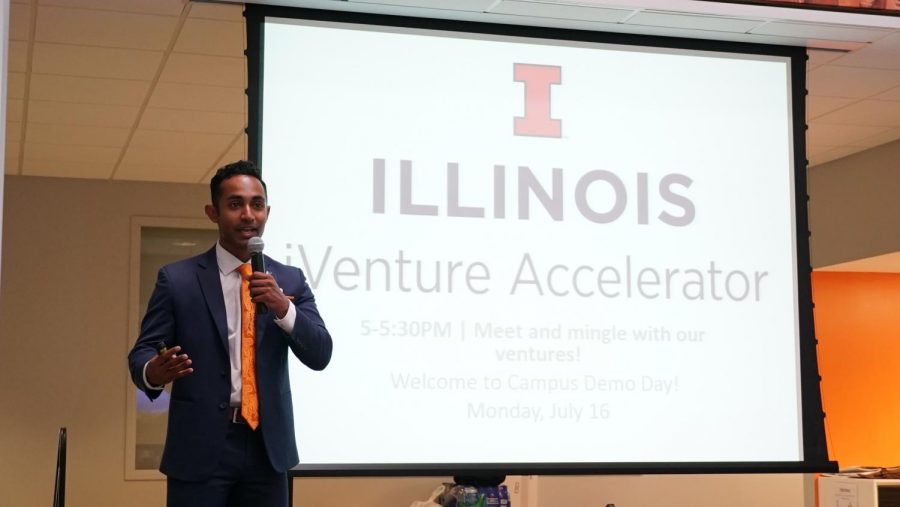iVenture enhances UI startup ecosystem
Photo Courtesy of Manu Edakara
Manu Edakara,. director for iVenture Accelerator, introduces the program to newly inducted startups on July 16, 2017.
Dec 6, 2018
Mark Van Den Avont had always been dissatisfied with the cost and quality of athletic mats as an amateur gymnast.
This spurred him into action when he compressed two vertebrae in his spine on March 23, 2017, while dismounting off the high bar in his senior year of high school.
Now a sophomore in Engineering, Van Den Avont has since made a full recovery and divides his time between academics and working on developing HexNest, a sports mat company he founded during his freshman year.
Their mats use impact attenuation technology — a test method that focuses on the performance of impact on certain surfaces — to create a safer environment for athletes without affecting their performance.
In the first few months, Van Den Avont worked on HexNest but struggled with understanding where he wanted to take his company. That is, until he came in contact with iVenture, the University’s educational accelerator program.
Get The Daily Illini in your inbox!
iVenture is a 50-week program for student entrepreneurs that sprouted from a course about community problems in the School of Social Work in 2015. Every summer, a few select startups receive $10,000 in seed funding — for which the University does not take any equity — while the founders receive a stipend of $2,500 to cover summer expenses.
“We’d probably be a little bit lost on what our goals are and where we want to go,” Van Den Avont said when asked about the importance of iVenture for his business. “We wouldn’t have an office. We wouldn’t have the money to do any of our testing and things like that. So we’d be in a pickle.”
HexNest was inducted into iVenture after going through the University’s Cozad New Venture Challenge. The challenge is a competition that encourages students to create new businesses and provide mentoring through the various stages a developing business goes through.
Stephanie Larson, associate director of Innovation & Entrepreneurship Student Programs at the Technology Entrepreneur Center, said Cozad is an important part of the University’s startup ecosystem. But before iVenture was introduced, student entrepreneurs often found themselves lost after the competition ended.
“Every year, we are always looking to see like what gaps we have in the ecosystem,” Larson said. “We felt like we had a gap for students after they went through Cozad. They would go through that, and then it was like, ‘Now what?’ We needed a follow up to that.”
To cater this need, Larson, who was also on the founding team for iVenture, said all the different programs on campus focusing on helping student entrepreneurs created an accelerator for student-led startups.
Since the program was launched, Manu Edakara, director of iVenture Accelerator, said the startups have raised over $6 million and created 32 full-time jobs.
Every summer, the inducted startups receive the opportunity to work full-time on their business from a co-working space at Temple Hoyne Buell Hall. In addition, Edakara said they also provide a slew of resources that are useful for the early-stage ventures.
Students in the program also have the opportunity to learn from esteemed entrepreneurs and University professors about topics ranging from negotiation to creativity. Once summer is over, student fellows have to enroll in a seminar course in entrepreneurship to continue their learning about early-stage startups.
“We’re really just consolidating a lot of the information, and we’re building pipelines,” Edakara said.
He also said iVenture is not like a classroom environment, but it’s more similar to a community. In addition to guidance the program provides, the iVenture team also connects student entrepreneurs with advisers, who can consult on the business’ problems.
Rohan Joshi, graduate student in Engineering, was a part of iVenture in 2017. Although the business he worked on then has since dissolved, he said the program’s resources still continue to benefit the startup he is working on now called QuillBot, a paraphrasing tool.
“Some of the resources surprised me,” Joshi said. “For example, if I want a connection with someone, I just emailed Manu, and he would make it happen. I was also surprised at how hands off it was, which I think is a very good thing, like, no one’s managing my business for me.”






